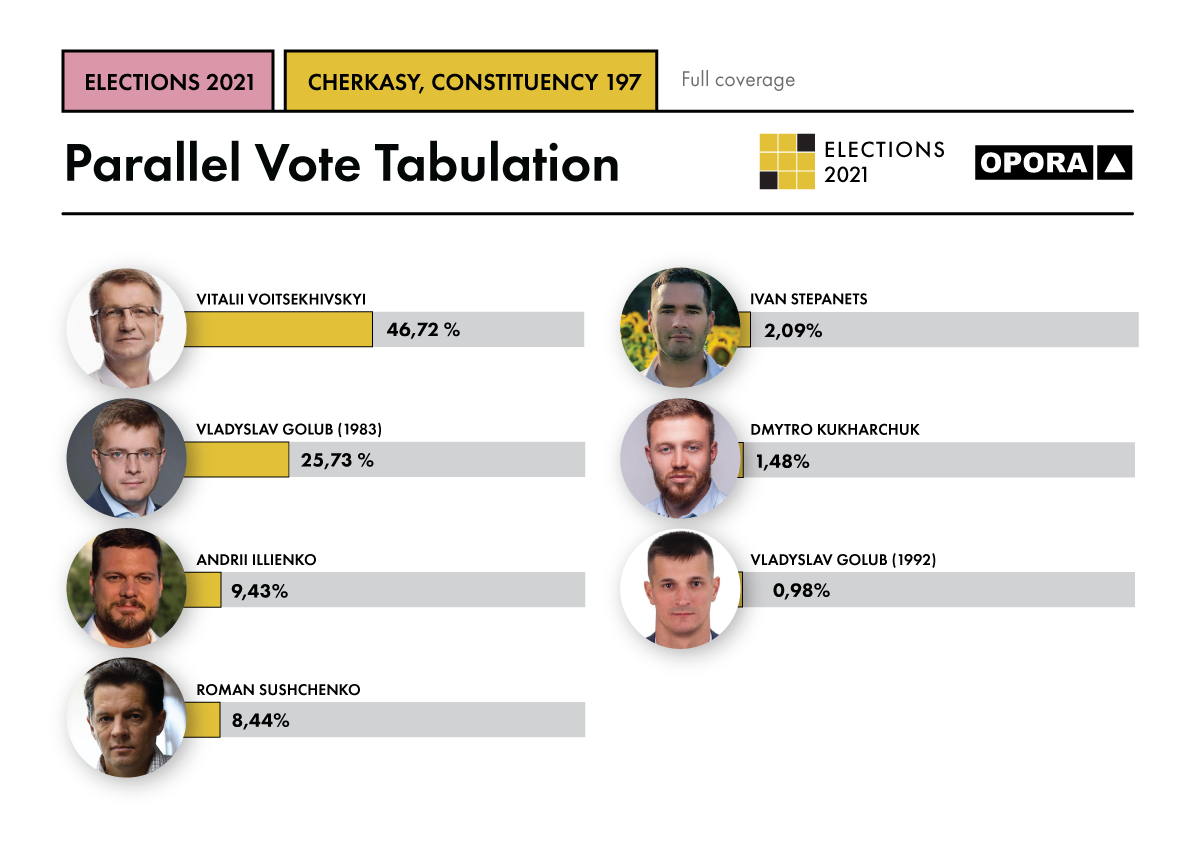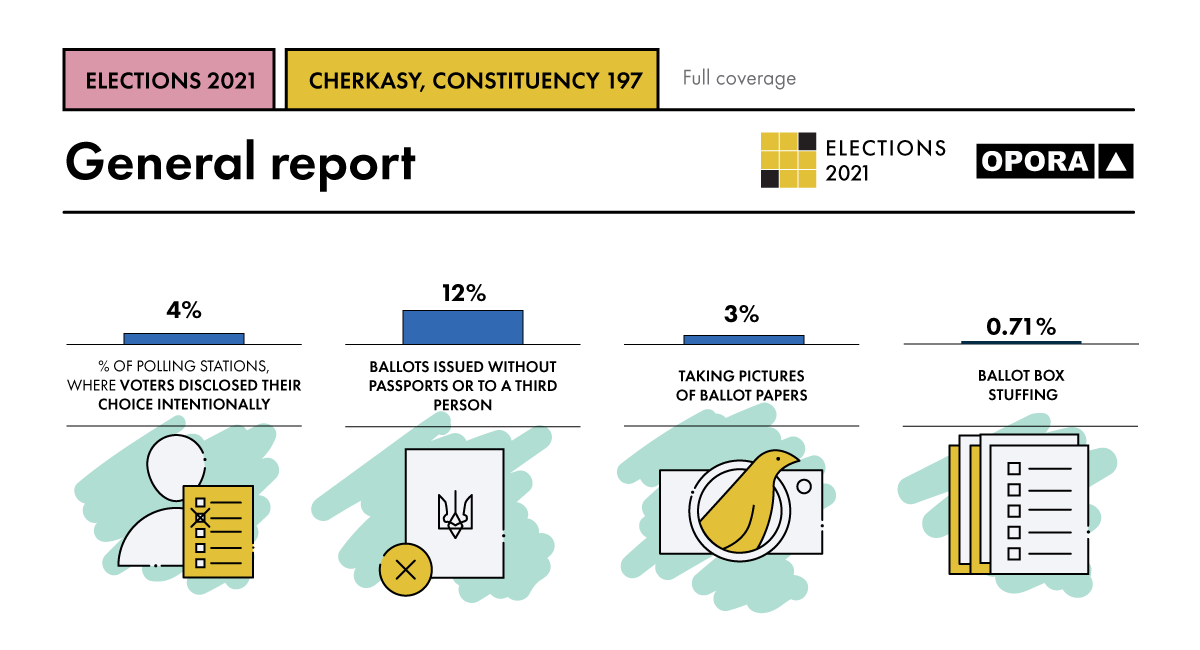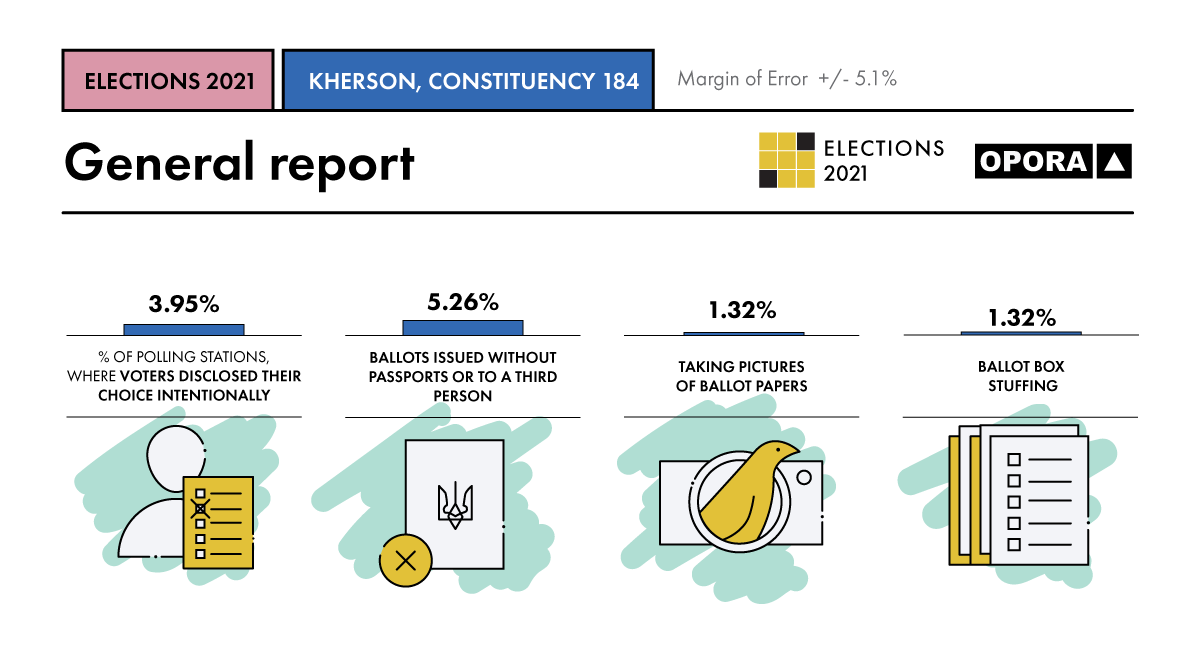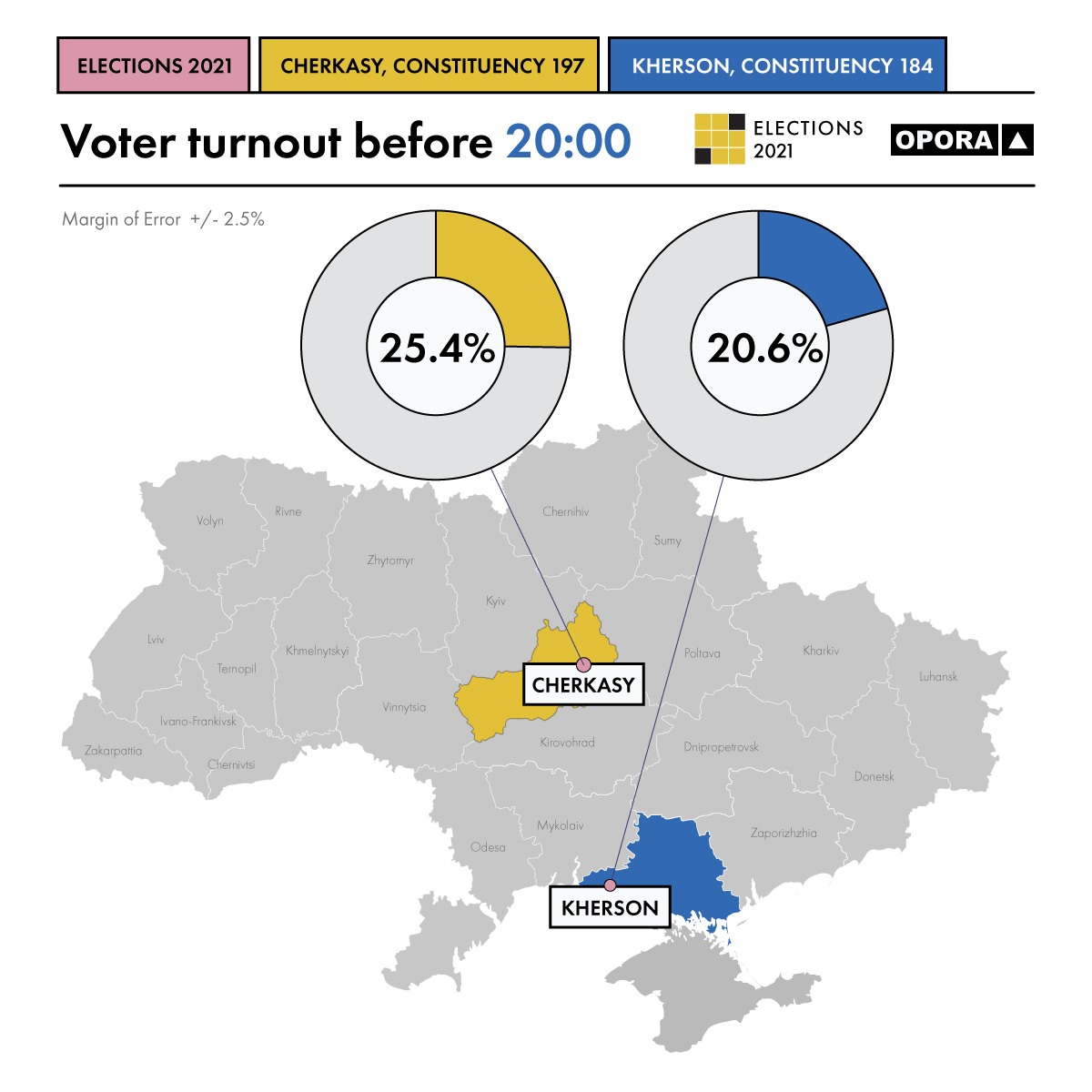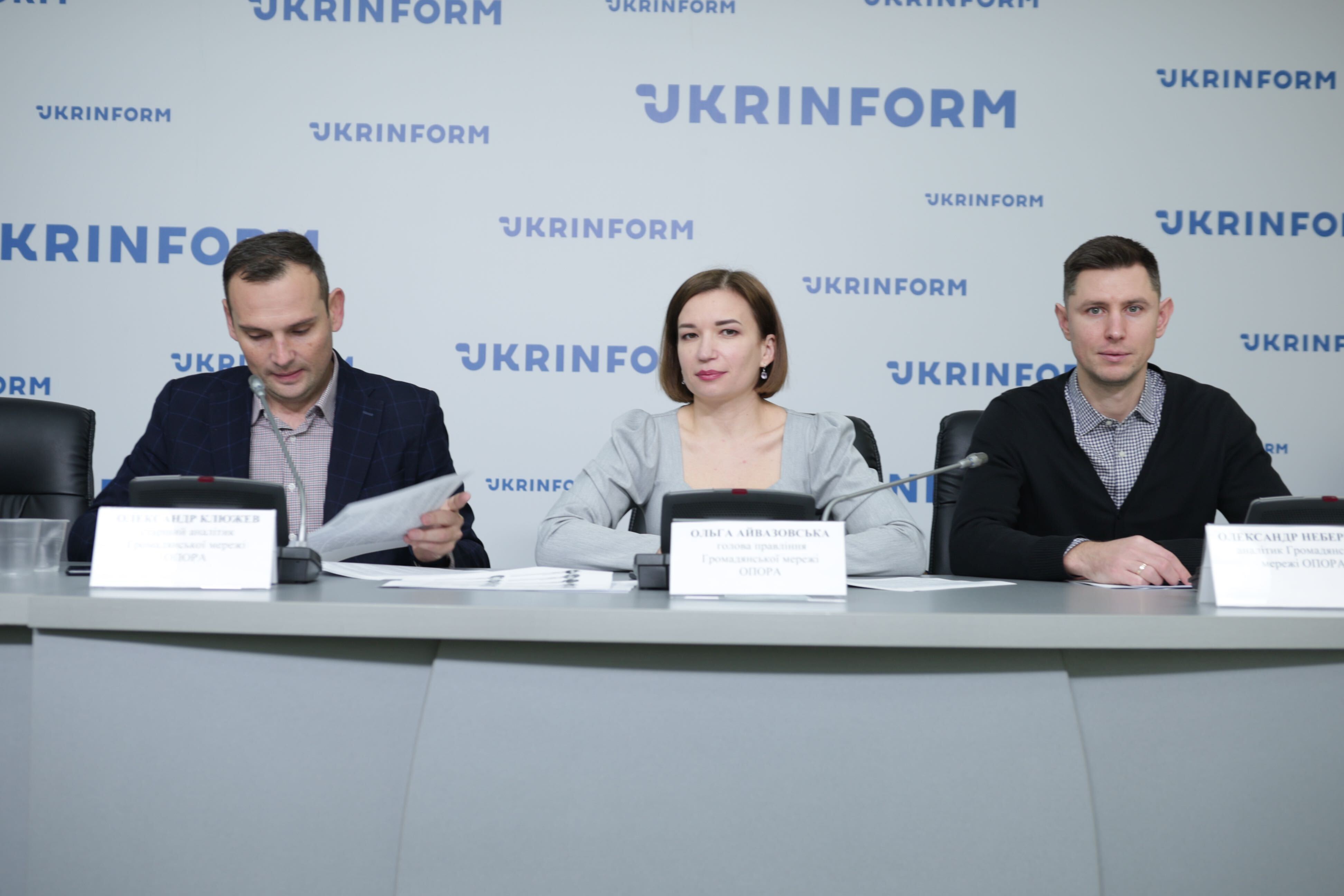On election day and the night of the vote count, OPORA observers recorded not so many violations: 50 in the Kherson Oblast, and 59 in the Cherkasy Oblast. However, candidates' election campaigns using administrative resources and "election charity", as well as notorious reports of possible voter bribery, could have a significant impact on the campaign and on the principle of equal rights and opportunities for candidates.
On October 31, voting in the by-elections of people's deputies of Ukraine took place in the single-mandate majority constituencies No.184 (Kherson Oblast) and No.197 (Cherkasy Oblast). OPORA provided non-partisan monitoring of the voting process and counting of its results at a statistically sound number of polling stations in the Kherson region and at all polling stations in the Cherkasy region. Prior to election day, the organization's observers monitored the legality of all stages of the election process and their compliance with democratic election standards. The maximum error of OPORA survey for the by-elections of the People's Deputy in constituency No.184 (Kherson region) is 5.10% (if in some cases the error differs, it will be indicated additionally). In constituency No.197 (Cherkasy region), the study covered observation of all polling stations in the constituency.
Based on the data from OPORA observers from constituency No.197, the results of the parallel vote tabulation are as follows: Vitaliy Voytsekhivskyi received 46.72% of the vote, Vladyslav Holub – 25.73%, Andriy Ilyenko – 9.43%, Roman Sushchenko – 8.44% . Other candidates received less than 5% of the vote.
Since the beginning of the PEC operations on election day, OPORA observers in the by-elections in constituency No.184 have identified and verified 50 violations of electoral law and democratic election standards, and 59 violations in constituency No.197.
Precinct commissions organized and held preparatory meetings on a rather proper level. At 4.35% of PECs in constituency No.197 of Cherkasy Oblast and at 6.58% of PECs in constituency No.184 of Kherson Oblast (error 9.6%), members of election commissions did not meet the requirements for keeping minutes at preparatory meetings. For the early elections of people's deputies in 2019, this figure was 5.7%, on a nationwide scale.
In the single-member constituency No.184 in Kherson oblast, 77.63% of PECs (error 9.6%) started preparatory meetings within the timeframe provided by the Electoral Code. In constituency No.197 (Cherkasy region), 82.61% of PECs complied with the established legal requirements. Other commissions started preparatory meetings earlier, which did not allow interested subjects of the election process to monitor all procedures of preparation for the opening of polling stations. In the early elections of people's deputies of Ukraine in 2019, the situation was similar – 81.6% of PECs within the country adhered to the start of the preparatory sessions. 23.68% of PECs in constituency No.184 of Kherson Oblast (error – 9.6%) and 18.12% of PECs of constituency No.197 of Cherkasy Oblast opened for voters before 08:00 am, formally violating the start time of voting.
The problem of issuing ballots to voters who did not have proper IDs prevailed on election day at polling stations, in both Cherkasy and Kherson oblasts. In constituency No.184, observers reported such violations in 5.26% of polling stations. In constituency No.197, where most polling stations are located mostly in rural areas, 12% of PECs were registered for such violations. In the 2019 parliamentary elections, observers witnessed the illegal issuance of balots in 10% of PECs.
The situation with the disclosure of the secrecy of ballot through the demonstration of a completed ballot by voters was approximately the same in these constituencies. Such actions were detected in 3.95% of polling stations in the Kherson region, and in 4% of PECs in constituency No.197. Photographs of completed ballots on election day were recorded in 3% of polling stations in Cherkasy oblast, and in 1.32% in constituency No.184. The lack of statistically significant indicators of violations related to attempts to throw ballots in bunches has also become a common feature of the voting process at polling stations.
On election day, October 31, the Civil Network OPORA also counted voter turnout in Cherkasy Oblast (constituency No.197) and in Kherson Oblast (constituency No.184). Data were recorded as of 12:00, 16:00 and 20:00. Thus, in the constituency No.184 (Kherson region), at 20:00, voter turnout was 20.6% (error – 2.5%). To compare: in 2019, in this constituency, voter turnout as of 20:00 was 46%. In the constituency No.197 (Cherkasy region) the turnout at 20.00 was approximately 25.4% (data may change slightly, by a maximum of 2%). In 2019, voter turnout in this constituency, as of 20:00, was 52%.
By-elections were held in a competitive environment, but they were accompanied by serious violations of Ukrainian law and international standards for democratic elections. Thus, the key challenges for the election process were the abuse of administrative resources, financial incentives for voters, non-transparency of election finances, and having competitors use the practice of registering twin candidates against active participants in the election process.
These elections were characterized by significant abuses of administrative resources, which directly affected the principle of equal rights and opportunities for candidates. Despite the use of this practice by various political forces, the biggest problem in the election process was about the attempts to abuse administrative resources in the interests of candidates from the "Servant of the People" party in constituencies No. and No.197, Vitaliy Voytsekhivskyi and Serhiy Kozyr. It was also common to involve central officials in various activities, to de facto support candidates from the "Servant of the People" party, as well as to benefit from the high-profile government programs (including the "Big Construction" program) for campaigning.
However, unfortunately, the electoral charity of the so-called third parties who were formally independent of the candidates but acted in their interests, remained a serious problem. First of all, we are talking about charitable foundations, which in some communities (for example, in constituency No.184 – the charity fund "We are here to live", associated with the candidate Hennadiy Lahuta) significantly influenced the course of the campaign.
The election campaign was accompanied by highly publicized reports about possible use of voter bribery technologies, in particular under the guise of networks of campaigners and supporters. These reports became especially pertinent on election day in constituency No.197 of Cherkasy oblast, where OPORA observers found a number of cases showing elements of controlling the arrival of voters to polling stations, exercised by persons who relied on the lists of citizens with their personal data.
OPORA demands that law enforcement agencies take immediate action to investigate reports of possible bribery and control of citizens' expression of will. OPORA also emphasizes that the parliament needs to further regulate the activities of the authorities in the election process, including the activity of political officials, and pay special attention to combating violations of the law and election standards by charities and other organizations affiliated with candidates.
